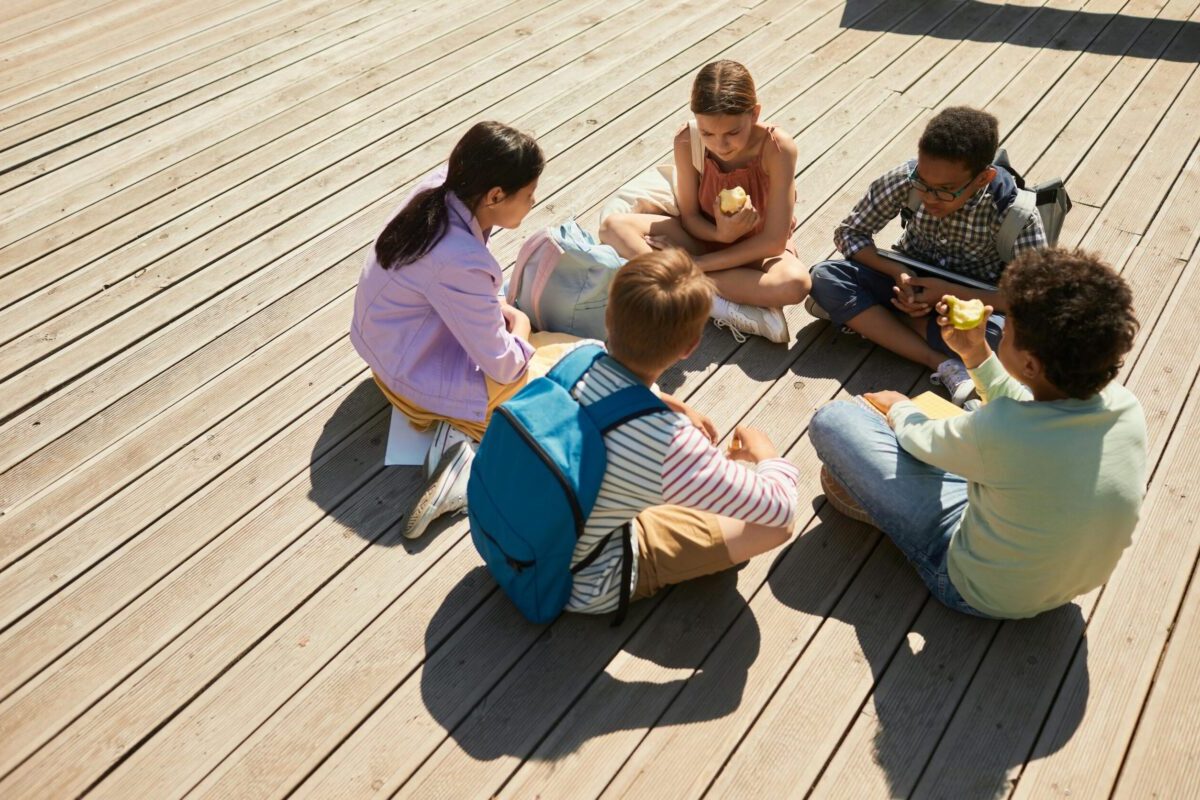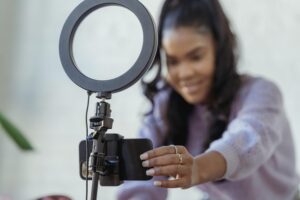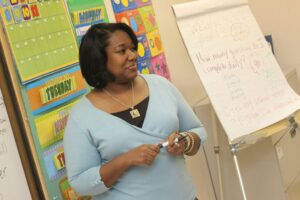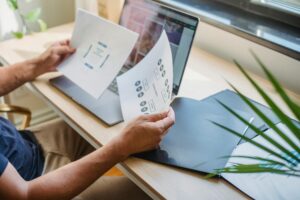Project Based Learning (PBL) is a teaching method that engages students in learning by solving real-world problems or creating meaningful products. PBL allows students to develop 21st century skills such as collaboration, communication, creativity, and critical thinking. PBL also fosters student autonomy, motivation, and ownership of their learning.
Here are some examples of project based learning prompts for elementary school students in grades 3-5; they organized by grade level and subject area. Each example includes a driving question, a brief description, and some possible outcomes or products.
Grade 3: Language Arts
How can we write and publish our own books?
Students learn about the elements and genres of fiction and nonfiction writing. They choose a topic or a theme that interests them and write their own books, following the steps of the writing process. They illustrate their books using various media and tools. They publish their books using online platforms or print them out. They share their books with their classmates, other students, or their families.
Possible outcomes/products: Books; illustrations; online or print publications; book reviews or recommendations; book talks or readings.
Grade 3: Math
How can we create and use a math board game?
Students learn about various math concepts and skills, such as fractions, decimals, percentages, etc. through creating and using a math board game. They research different types of board games and the math skills involved in playing them. They design and create their own math board game, using different materials and tools. They test and improve their math board game, using feedback and rubrics. They exchange their math board games with their classmates or other students and try to play and win them, using math reasoning and strategies.
Possible outcomes/products: Math board game; feedback or rubrics; play or win reports.
Grade 3: Science
How can we create and use a simple machine?
Students learn about the types and functions of simple machines, such as levers, pulleys, wheels, etc. through creating and using a simple machine. They research different examples and applications of simple machines and how they make work easier. They design and build their own simple machine, using recycled or low-cost materials. They test and improve their simple machine, following the safety and ethical guidelines. They use their simple machine to perform a task or a challenge, such as lifting a weight, moving an object, etc. They collect and compare data on their simple machine’s performance, such as force, distance, speed, etc.
Possible outcomes/products: Simple machine; data tables or graphs; analysis or improvement reports; presentations or videos to demonstrate and explain their simple machine.
Grade 3: Social Studies
How can we celebrate the diversity of our community?
Students learn about the different cultures, traditions, and backgrounds of their classmates and their families. They interview their family members and peers about their heritage, customs, languages, foods, etc. They create a cultural artifact or a representation of their identity, such as a collage, a map, a flag, a poem, etc. They organize a multicultural fair where they showcase their artifacts and share their stories.
Possible outcomes/products: Cultural artifacts or representations; interviews or stories; multicultural fair; brochures or flyers to invite or inform others.
Grade 4: Language Arts
How can we create and perform a puppet show based on a fairy tale?
Students learn about the elements and genres of literature and drama through creating and performing a puppet show based on a fairy tale. They choose a fairy tale that they like or are familiar with, such as Cinderella, Jack and the Beanstalk, Little Red Riding Hood, etc. They adapt the fairy tale into a script, using dialogue, narration, and stage directions. They create their own puppets, using various materials and techniques. They rehearse and perform their puppet show in front of their classmates or other audiences.
Possible outcomes/products: Puppet shows; scripts; puppets; performances; feedback or evaluations.
Grade 4: Language Arts
How can we create and perform a skit based on a book or a movie?
Students learn about the elements and genres of literature and drama through creating and performing a skit based on a book or a movie. They choose a book or a movie that they like or are familiar with, such as Harry Potter, The Lion King, Wonder, etc. They adapt the book or the movie into a skit, using dialogue, narration, and stage directions. They create their own props, costumes, or scenery, using various materials and techniques. They rehearse and perform their skit in front of their classmates or other audiences.
Possible outcomes/products: Skits; scripts; props, costumes, or scenery; performances; feedback or evaluations.
Grade 4: Social Studies
How can we create a podcast about a state or a country?
Students learn about the geography, history, and culture of different states or countries through creating a podcast for their classmates or other audiences. They choose a state or a country that they want to learn more about, such as California, Mexico, China, etc. They research different aspects and features of their chosen state or country, such as location, climate, population, landmarks, traditions, etc. They create a podcast script that includes an introduction, a main body, and a conclusion, as well as a bibliography. They record and edit their podcast using audio editing software or tools. They publish their podcast online and share it with their classmates or other audiences.
Possible outcomes/products: Podcasts; scripts; bibliographies; online publications; feedback or comments.
Grade 4: Social Studies
How can we create a travel guide for our state?
Students learn about the geography, history, and culture of their state through creating a travel guide for visitors. They research different regions, landmarks, attractions, events, etc. that are unique or important to their state. They choose a format and a style for their travel guide, such as a brochure, a website, a podcast, etc. They write and organize their information, using persuasive and informative language. They include maps, images, or other media to enhance their travel guide.
Possible outcomes/products: Travel guides; maps, images, or other media; presentations or videos to showcase their travel guides.
Grade 5: Language Arts
How can we create and publish our own podcasts?
Students learn about the features and techniques of podcasting and audio storytelling through creating and publishing their own podcasts. They choose a genre and a topic for their podcasts, such as news, opinion, fiction, nonfiction, etc. They write their podcast script, using dialogue, narration, and sound effects. They record and edit their podcast, using audio editing software or tools. They publish their podcast online and share it with their classmates or other audiences.
Possible outcomes/products: Podcasts; scripts; online publications; feedback or comments.
Grade 5: Language Arts
How can we create and publish our own comic books?
Students learn about the elements and genres of comic books and graphic novels through creating and publishing their own comic books. They choose a genre and a topic for their comic books, such as fantasy, science fiction, adventure, etc. They write their comic book stories, using dialogue, narration, and plot. They illustrate their comic books, using various media and techniques. They edit and revise their comic books, using peer feedback and rubrics. They publish their comic books online or print them out. They share their comic books with their classmates or other readers.
Possible outcomes/products: Comic books; illustrations; online or print publications; feedback or evaluations.
Grade 5: Social Studies
How can we create a museum exhibit about the American Revolution?
Students learn about the causes, events, and effects of the American Revolution through creating a museum exhibit for their school or community. They research different aspects and perspectives of the American Revolution, such as the colonists, the British, the Native Americans, the loyalists, the patriots, etc. They choose a format and a theme for their museum exhibit, such as a timeline, a map, a diorama, a biography, etc. They write and organize their information, using historical evidence and sources. They include artifacts, images, or other media to enhance their museum exhibit.
Possible outcomes/products: Museum exhibit; information; artifacts, images, or other media; presentations or videos to showcase their museum exhibit.
Grade 5: Social Studies
How can we create a brochure about a national park?
Students learn about the geography, history, and culture of different national parks through creating a brochure for visitors. They choose a national park that they want to learn more about, such as Yellowstone, Grand Canyon, Yosemite, etc. They research different aspects and features of their chosen national park, such as location, climate, wildlife, landmarks, activities, etc. They choose a format and a style for their brochure, such as a tri-fold, a bi-fold, a booklet, etc. They write and organize their information, using persuasive and informative language. They include maps, images, or other media to enhance their brochure.
Possible outcomes/products: Brochure; maps, images, or other media; presentations or videos to showcase their brochure.
By integrating the project-based learning (PBL) examples provided—or adapting them to better suit your needs—you can empower students to actively engage with real-world challenges and complex inquiries. This approach not only facilitates knowledge acquisition but also cultivates vital life skills, including problem-solving, critical thinking, and collaboration.
Through PBL, we can create an environment where learning is synonymous with discovery, and education is a collaborative journey towards a more informed and capable generation.







